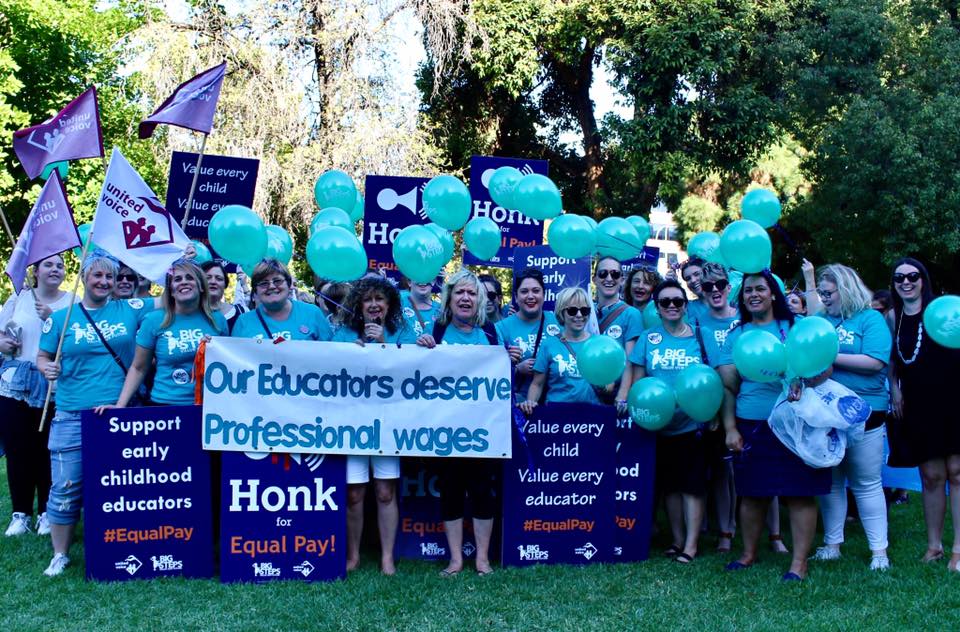Early childcare workers show how to celebrate International Women’s Day.
Written by: on
On March 8, 2017 women everywhere celebrated International Women’s Day.
Reflecting the origins of the day in the struggles of working class women, thousands of United Voice members in the 94% female early childhood workforce walked out of their workplaces this afternoon.
Early childhood workers receive about half the average wage. The 80,000 plus workforce educates about a million children in the long day care sector.
Parents interviewed about the action were overwhelmingly supportive.
Low pay in this sector is directly related to its predominantly female workforce.
Working class origins of International Women’s Day
International Working Women’s Day, as it was then called, had its origins in a March 8, 1909 commemoration of a strike the previous year by women organised through the International Ladies Garment Workers’ Union in New York.
In August 1910, socialist women organised an International Women’s Conference demanding equal rights for women, including the right to vote. Recognising the significance of the drawn-out textile workers’ strikes, the Communist leader Clara Zetkin and other left-wing women proposed an international day of action in support of working women. Initially, the date varied from year to year, but after 1914, and in recognition of the day on which the first celebration of the textile workers’ strikes had occurred, the day was changed to March 8 and has remained that day since.
In 1917, women in the Russian city St Petersburg went on strike for bread and peace. Female textile workers again took the lead. Over the next five days the whole of the city was in turmoil as a general strike developed with the support of the Czar’s soldiers and sailors. The regime fell, bringing forth a bourgeois Constituent Assembly and the conditions for the seizure of power by the workers, peasants and soldiers in November.
The new Bolshevik government made March 8 an official holiday and day of celebration. For decades, March 8 was mainly celebrated in Communist states and largely associated with the Communist cause.
Under the impact of the women’s liberation movement of the sixties and seventies, bourgeois states began co-opting the movement. Particularly from 1975, the International Women’s Year, and through the influence of the United Nations, more and more capitalist governments began to provide funding for a broad celebration of women of all classes, and the focus on working women was largely pushed aside.
The Australian International Women's Day committee appears to have been totally absorbed by the corporate sector. There is no mention of the socialist origins of the celebration. Instead there is a list of corprorate sponsors including BP, Caterpillar, European Bank, PepsiCo, Vodafone and Western Union all espousing the tremendous contributions women in the corporate sector can make to innovation and productivity.
That is why today’s action by women in the early childhood sector is important: it reminds us that working class women are doubly oppressed – not just by gender but also by class.
Indeed, for all of the claims that progress has been made in achieving equality for women, working class women have seen retreats in wage equality and access to permanent full-time work. The gender gap in pay is rising again.
Too many women of all classes still suffer domestic violence because of patriarchal traditions embedded in the notion of women as property. For some men, women can be treated in the same way as any old piece of garbage found around the home. They “belong” to their husbands in the same that a fishing rod or a car belongs: “my fishing rod”, “my car”, “my wife”, “my partner” – and because they are “mine” I’ll do as I want with them.
Working class men will take the lead in the ranks of men fighting against the division of the working class by gender. No section of men has greater need to overcome that division. Racism divides the working class to the benefit of the capitalists. So do reactionary and “blokey” attitudes towards women.
Working women must regain their rightful place at the core of the women’s movement.
The working women’s movement is a key component of the struggle for anti-imperialist Australian independence and socialism.
.................................
Further reading on this topic here: International Women's Day: The militant history of a global celebration
Print Version - new window Email article
-----
Go back
Independence from Imperialism
People's Rights & Liberties
Community and Environment
Marxism Today
International
Articles
| No Pride in an Ongoing Genocide |
| Adelaide Writers’ Week near collapse as authors stand with Dr Randa Abdel-Fattah |
| When we fight back, let’s stand on solid ground |
| Don’t let responses to Bondi silence our voices! |
| Dangers in multinational corporations’ drive to establish Space-based data centres |
| Criminalising Lenin - Putin’s attempts to stifle dissent |
| Wage-theft: an Australian standard business practice |
| The Whitlam Dismissal: America's coup for the control of Australia |
| Party booklet on Whitlam dismissal released |
| CPA (M-L) paper on fascism in Australia |
| Let the ruling classes tremble at the sight of the fighting Filipino masses |
| Labor law used to intimidate and harass opponents of genocide |
| Book Review: The New Age of Sexism |
| Violent Nazi attack on Camp Sovereignty should be investigated as a hate crime |
| Let Palestinians decide! |
| We stand with Mary! |
| Israel illegally boards Freedom Flotilla Boat: Albanese must protect Australians involved |
| New Freedom Flotilla heads for Gaza as massacres increase. |
| Terrorism? Where do we stand? |
| Solidarity with the courageous resistance against mass deportations and the establishment of a fascist dictatorship in the USA |
-----

